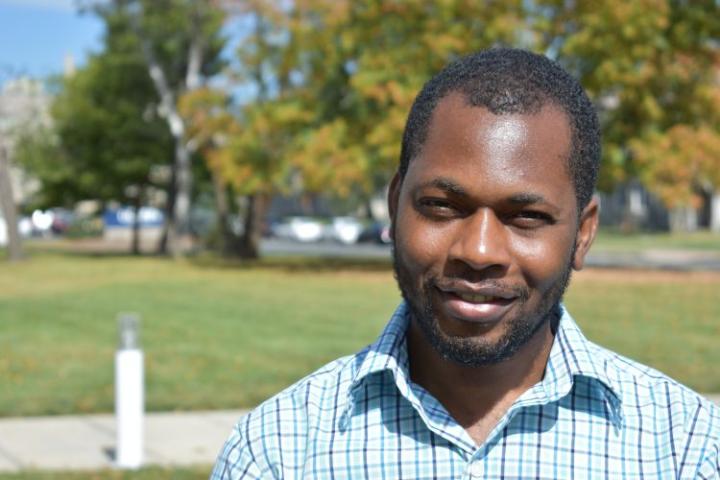Peacemaker Profile: Guimond Pierre Louis of Haiti
November 9, 2017

Our 2017-18 class of International Peacemaking Program fellows includes nine students, four from the U.S. and five from other countries. We asked each one of them the same set of questions.
Q. Briefly tell us about your educational background.
A. I attended high school in the countryside of Haiti, where I grew up. In 2007, I moved to Port-au-Prince and attended Université Épiscopale d'Haiti, and received a degree in accounting in 2011. In November 2011, I entered Séminaire de Théologie d’Église Épiscopale d’Haïti (STEEH) in order to become a priest. I completed my degree in theology in December 2015. Meanwhile, in my free time I used to take many online courses and received certificates in subjects like: Climate Change, Entrepreneurship, Philosophy, Project Management, etc.
Q. How did you learn about Hartford Seminary’s International Peacemaking Program?
A. I learned about Hartford Seminary through Dr. Lucinda Allen Mosher who came to Haiti to teach at STEEH. I always wanted to do advanced studies. I told her that. She told me about the International Peacemaking Program offered by Hartford Seminary. I responded that it sounds relevant to me and it will help me become more useful for my country. So, I applied and after a while, I received an email telling me that I have been admitted to Hartford Seminary.
Q. Why are you interested in learning about peacemaking?
A. Our world is frightened. People everywhere are longing for peace, internal or external. So, I believe we need peacemakers to help people working for the common good, to help people engaged in the process of making this world a better place for us and for the future generations no matter what religion they belong to. I believe I can be one of these peacemakers. That’s why I am interested in learning about peacemaking.
Q. How do you hope to use your skills after a year of training as a peacemaker?
A. I will go back to my country to serve as a peacemaker. The skill I will have after this year of training will help me to implement an interfaith dialogue group in Haiti. This group will have the goals to help people become more tolerant and work together for the common good, without intention to convert anyone in a particular confession of faith.
Q. Tell us a little about your home country and the interreligious conflict it faces.
A. In Haiti, there is no physical threat for being part of a religion or a denomination. People who are extremist will usually avoid having contact with you. The religious problem that Haiti is facing has two aspects: firstly, the intolerance between some Christian denominations toward other Christians; and secondly, the hostility that exists in many Christians toward voodoo.
Q. Give us a quick description of your home life (family, where you live, etc.)
A. There are five children in my family: my mother and my father, three brothers, one sister and me. We grew up in the countryside. My father is a farmer and my mother a shopkeeper. My mother is 59 and she is one year younger than my father. My siblings live at Port-au-Prince for work and study while my mother and my father are still living in the countryside.
Q. Hartford Seminary is using the phrase “We Were Built for This Time” to address the deep divisions in our country and across the world. What does that mean to you?
A. It means for me that Hartford Seminary is a place where the past is not forgotten, but is used to understand the present and face the challenges of this post-modern world in order to prepare the future. It also means for me that Harford Seminary is engaged in transforming this world to a better place by equipping his students from all over the world with solid skills to address the divisions and conflicts that exist within and outside people.
Join our mailing list
Keep up with all the latest happenings at Hartford International.

